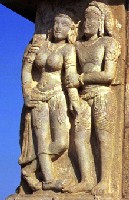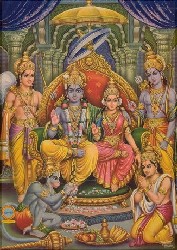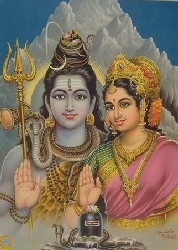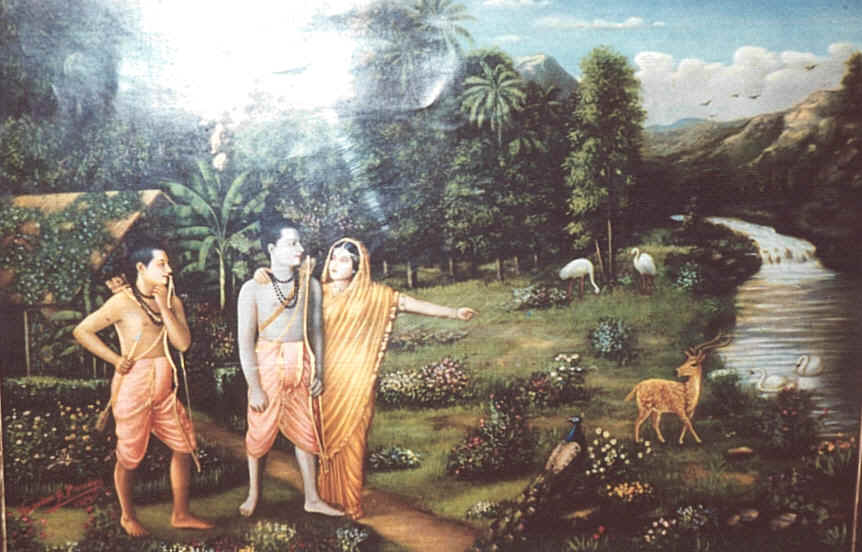|
Ancient Indian literature has saved many valuable evidences of sexual
relationships among Early Indian ascetics. Here is the list of the adapted web versions of some
legends of ascetic couples called mithuna.
All the legends carry sad imprints of destructive changes in ascetic life.
Apparently, they were fixed on the decline of Buddhist
period of Indian history the happy time
when in India there were men and women enjoying pure and natural life. Therefore these stories matter mainly as evidences existence of
sex among Ancient Indian ascetics, but not as
descriptions of original ascetic lifestyle. This fact should be taken as a
background of the Indian Buddhist sculptures of
wide-hipped women.
-
Savitri and Satyavan
-
 ![]() This is one of the finest touching stories of female loyal love. However, it
contains some sad signs of bad changes:
Savitri falls in love with the ill man (Satyavan) doomed to die in a year. Thus, we can
state a case of the sexual mis-selection
here, which seemingly signifies that ascetic women had become hormonally
disturbed.
This is one of the finest touching stories of female loyal love. However, it
contains some sad signs of bad changes:
Savitri falls in love with the ill man (Satyavan) doomed to die in a year. Thus, we can
state a case of the sexual mis-selection
here, which seemingly signifies that ascetic women had become hormonally
disturbed.
An illustrated but more adapted version of this story (as well as some other stories) is
presented in IndoLink site of Indian
emigrants in the USA.
-
The Recognition of
SHakuntala
- Famous drama by great Ancient Indian poet Kalidasa. This drama is
based on earlier legends according to which Shakuntala (also Sakuntala) was born from the union of an ascetic and an
apsara
(a nymph of Indian mythology, originally female ascetic, evidently), and later gave birth to her son in
an ascetic settlement.
The legend reflects the destructive changes
in life of Ancient Indian ascetics - people of arms begun to marry beautiful
female ascetics and take them away from the hermitages.
There is a shortened version of
Story of Shakuntala.
-
The Ramayana
-
 ![]() One of two greatest Ancient Indian eposes. Its heroes Rama and his consort Sita
as well as his brother Lakshmana
are pictured living in a forest hermitage near the Himalayas. This fact was explained with the exile because
people of the later epoch could not assume that these great heroes lived so plain
(compare the later Hindu picture right).
One of two greatest Ancient Indian eposes. Its heroes Rama and his consort Sita
as well as his brother Lakshmana
are pictured living in a forest hermitage near the Himalayas. This fact was explained with the exile because
people of the later epoch could not assume that these great heroes lived so plain
(compare the later Hindu picture right).
The whole story is devoted to abduction of a beautiful female from ascetic hermitage by Ravana the evil king of ruffians.
The available web versions pass by interesting episode of villain Ravana's persuasions. When he attempts to persuade beautiful Sita into leaving the forest hermitage for his royal
palace, he calls her wide-hipped, rich-hipped.
This story ends happy, but in fact small paradises of ascetic hermitages were destroyed by aliens.
There is an illustrated but more adapted version of
The Ramayana
-
 ![]()
-
Sati & Shiva
-
It is noteworthy that Shiva was worshiped as the god of ascetics,
and his home is believed to be in the Himalayas — the homeland of Yakshas!
He also was related to sexuality very much.
-
-
Upagupta: The Buddhist Monk
- This story carries a shade of the period of destruction of ascetics' life. Beside,
it contains an appreciable narrative evidence of Mathura sculptor portraying a beautiful female
ascetic.
-
Sudama
- This story also reflects the bad changes in life of ascetics. The matter is
that before ascetics were as respectable as kings in Indian society, while
this story portrays another state.
The past existence of sexual love among Ancient Indian ascetics was possible owing to real health of the women. The latter ought to be due vegetarianism, surely intrinsic for Ancient Indian ascetics, and consumption of plants containing substances indentical to female sex hormones, whch ought to include pomegranate, licorice, coconut, and dates in the case of India.
By the way, all the nisfortunes happened to the heroes of Ramayana because of Sita's desire for a deer — a kind of violation of vegetarianism.

Enjoy downloadible audioversion of Ramayana at Audible.com.


|




